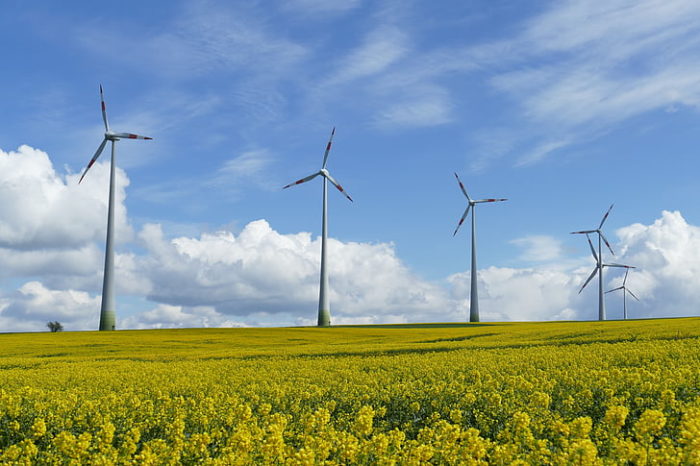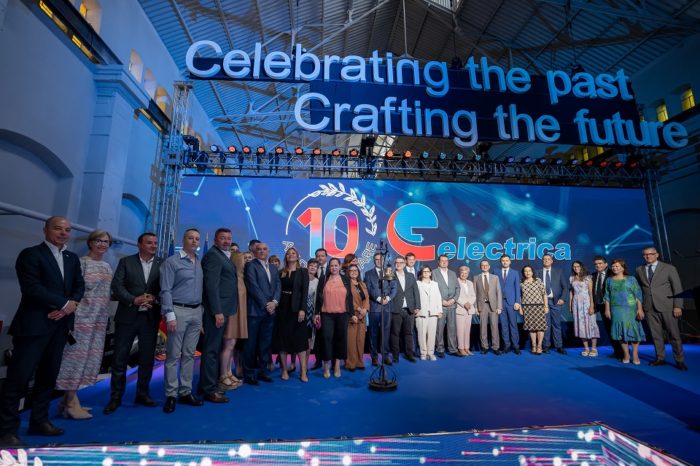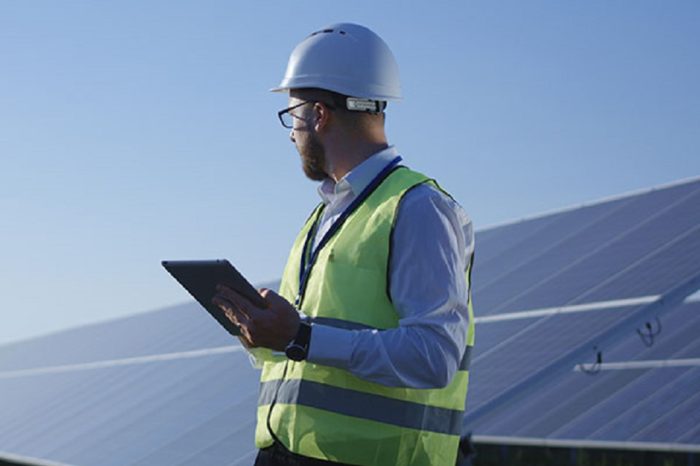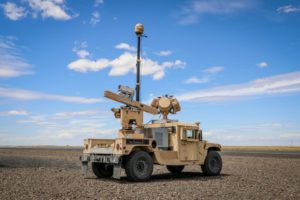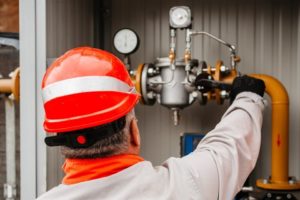Meet the Leaders: Alexandru Chiriţă, CEO of Electrica

This year, The Diplomat-Bucharest shares with its valued partners and audience, a momentous milestone – the 20th anniversary on the business media segment in Romania.
So, we came a long, wonderful and also challenging way to this year, when we celebrate two decades of unwavering dedication to excellence in media and our relentless pursuit of delivering insightful, timely and impactful business news and events. To celebrate this milestone, THE DIPLOMAT-BUCHAREST connects with businesspeople and put into light their excellence and performances in a special event, THE DIPLOMAT-BUCHAREST AWARDS GALA. This year, the special Awarding Gala ceremony will take place on October 22, at JW MARRIOTT BUCHAREST GRAND HOTEL, Grand Ballroom.
To mark the occasion, we invited Alexandru Chiriţă, CEO of Electrica to share with us some of his opinion regarding the business expectations and conclusions for the first half of this year.
The business sentiment of 2024
The global economic context and evolving European energy policies create a challenging environment, but they also present significant opportunities for companies ready to adapt and innovate. 2024 is shaping up to be a year of transformation and opportunity, not just for Electrica but for the energy industry as a whole.
So far this year, among our key achievements are the development of green energy projects, expanding our portfolio with new business segments that facilitate the energy transition and becoming the first company in Romania to implement an AI system for energy footprinting at our headquarters. However, perhaps our most important achievement was a strong focus on investments in strengthening and modernizing our distribution networks. These investments are essential for both the modernization and development of the infrastructure we manage and the provision of high-quality services for our customers, as well as for supporting the transition to increasingly sustainable energy sources.
This year also marked the 10th anniversary of our admission to trading, a very important milestone in the company’s evolution and the largest initial public offering in the history of the Romanian capital market. It has been a decade marked by significant achievements and major transformations, and we have the confidence that we are on the right path to continue this positive trend in the future.
That said, challenges persist. The transition to greener and more sustainable energy requires even more substantial investments, both in modernizing our grids and driving technological innovation. Balancing these investments with our financial goals and sustainability commitments is another critical focus for us. At the same time, we’re focused on diversifying our service offerings to better meet the evolving needs of our customers and to unlock new growth opportunities.
Looking ahead, we will remain actively engaged in Romania’s energy transition, supporting initiatives that promote renewable energy sources and the reduction of carbon emissions. We are committed to being a trusted, transparent, and customer-focused company, responsive to the needs of our clients and partners. 2024 is a year of transformation and consolidation for us, and our team is well-prepared to seize the opportunities ahead and tackle challenges in a sustainable and responsible manner.
What matters most for a leader in 2024
I believe what matters most for a leader is the ability to navigate change with agility, empathy, and vision. The energy industry, like many others, is in a period of rapid transformation driven by technological advancements, regulatory shifts, and the urgent need for sustainability. As leaders, we must embrace this change, fostering a culture of innovation while staying deeply connected to the core values of our organization.
One of the most crucial aspects of leadership today is the ability to inspire and guide teams through uncertainty. This requires not only a clear strategic direction but also a deep understanding of the human element behind the business. In a world where change is the only constant, empathy becomes a powerful tool. We must actively listen to our teams, understanding their concerns, aspirations, and the challenges they face. It is through this empathy that we can create an environment where every individual feels valued, motivated, and empowered to contribute to our shared goals.
Another critical element is resilience. As leaders, we must lead by example, demonstrating the ability to adapt and remain focused despite external pressures. In the context of Electrica, this means staying committed to our long-term vision of energy transition, while also managing short-term challenges such as market volatility and regulatory changes. Our role is to maintain this balance and ensure that our teams have the resources, tools, and support needed to thrive.
The most empowering message I would send to my teams is this: We are at the forefront of shaping the future of energy, and each of you plays a vital role in this mission. Our work not only impacts our company but also the communities we serve and the broader transition toward a more sustainable future. Together, we have the power to innovate, to lead with purpose, and to make a lasting positive impact.
I encourage our teams to embrace a mindset of continuous learning and innovation. The energy sector is evolving rapidly, and we need to be proactive in adapting to new technologies, regulatory requirements, and customer expectations. But more importantly, I want them to know that they are not alone in this journey. I am committed to providing them with the leadership, support, and resources they need to succeed. We will face challenges, but I have no doubt that together, with our combined talents and commitment, we can overcome any obstacle.
Ultimately, what empowers our teams is the belief that their work matters and that they are part of something bigger than themselves. At Electrica, we are not just delivering energy; we are driving progress, building a more sustainable future, and creating a lasting legacy. This sense of purpose is what unites us and propels us forward.
The fundamentals of leadership
The fundamentals of leadership are timeless, though the way we apply them in a rapidly changing world like 2024 requires adaptation and evolution. For me, leadership is grounded in five core principles: vision, integrity, communication, empathy, and empowerment. The goal is to cultivate a culture of collaboration and continuous improvement. I believe in leading with purpose and instilling a shared sense of mission across the organization. I encourage my teams to embrace change, to innovate, and to take calculated risks, knowing that they have the support of leadership behind them.
Moreover, I strive to create an environment where each person feels connected to our work and understands how their contributions are making a difference, not just to the company but to society at large. This approach has proven to be highly effective in motivating our teams and in driving the kind of innovation and resilience required in an industry that is undergoing significant transformation.
One key area for consolidation is our focus on collaboration and teamwork. As we transition towards more digital and sustainable energy solutions, cross-functional collaboration is essential. Strengthening this culture will ensure that innovation flows freely and solutions are developed with diverse perspectives in mind.
On the other hand, we need to adapt our approach to flexibility and agility. The energy industry is changing rapidly, and we must encourage our teams to be more adaptable, embracing new technologies and methodologies. Fostering a mindset of continuous learning and innovation will help our people stay ahead of industry shifts and market demands.
Also, we must place even more emphasis on accountability and performance excellence. Clear goals, regular feedback, and measurable outcomes are crucial in keeping everyone aligned with our strategic vision. By empowering individuals to take ownership of their work and hold themselves to high standards, we can continue to deliver value to our customers and stakeholders while growing as an organization.
Making the best of technology
We are already seeing significant impact across various business functions in the energy industry. The primary areas where AI is making a difference include grid management, operational efficiency, customer service, and predictive maintenance. And to measure its impact, the focus is on key performance indicators such as reduced operational costs, improved grid reliability, faster issue resolution times, and enhanced customer satisfaction scores.
In grid management, for example, it helps optimize the distribution network, predict energy demand and improve grid stability. It enables us to integrate renewable energy sources more effectively while reducing outages and improving response times. Also, AI tools help monitor and predict equipment failures, allowing us to perform proactive maintenance, thus reducing downtime and extending the lifespan of critical infrastructure.
Through AI-powered data analytics, we are able to streamline operations, identify inefficiencies, and make informed decisions that improve productivity and reduce costs, and AI-driven platforms allow us to provide more personalized and responsive customer experiences. From chatbots to predictive billing, it enhances customer satisfaction and operational responsiveness.
Challenges in business
For the energy sector, one significant red flag is market volatility, where unpredictable price fluctuations and shifting economic conditions can create instability. We must be vigilant, stay informed and prepared to adjust our strategies quickly to mitigate potential risks. Another key concern is the evolving regulatory framework. With sustainability and emissions regulations becoming more stringent, any lack of preparedness could hinder our operations. Remaining compliant while anticipating future policy changes will be essential to staying ahead of the curve.
Additionally, cybersecurity threats are becoming increasingly prevalent as we embrace more digital tools and infrastructure. The integration of advanced technologies like AI, smart grids, and digital customer solutions has enhanced our operations, but it also makes us more vulnerable to cyberattacks. Ensuring we have strong cybersecurity measures in place is non-negotiable. Equally important is guarding against the slow adoption of innovation within the organization. Resistance to change, particularly in embracing digital transformation and AI-driven solutions, could impede our ability to grow and compete effectively in the market. It is vital that we foster a culture that is open to new technologies and approaches.
On the opportunity side, there is a tremendous chance to expand our footprint in renewable energy. With global momentum moving toward sustainability, there is increasing demand for wind, solar, and energy storage solutions. By continuing to invest in these areas, we can capture a significant portion of this growing market.
Moreover, our ongoing digital transformation provides us with substantial opportunities. Through the use of AI and other digital technologies, we can optimize our operations, enhance the customer experience, and streamline efficiency across the board. Our partnership with Esyasoft Holding Ltd. is a prime example of how we are leveraging technology to lead the industry. It consists of a joint-stock company which will produce and operate advanced technologies in the field of green energy, for the national and European market. Through the new company, in which Electrica will hold 25% of the share capital and EsyaSoft 75%, we will build production units for green energy equipment, as well as electricity storage solutions and digitalization solutions for the electricity distribution network (smart meters). The project also includes the development and operation of an infrastructure for charging electric vehicles.
Another significant opportunity lies in sustainability leadership. We have the potential to be at the forefront of the energy transition, positioning Electrica as a leader in green energy and reducing carbon emissions. This not only aligns with global sustainability goals but also strengthens our market position as a forward-thinking energy provider.
Lastly, talent development within the company represents an untapped opportunity for growth. By investing in our people through upskilling initiatives and encouraging innovation, we can unlock new capabilities and drive future success. I truly believe that our teams are our greatest asset, and fostering their development will ensure we remain competitive and adaptive in the fast-evolving energy landscape.
Evolving in a sustainable manner
In the energy industry, growing and evolving in a sustainable and remarkable way requires a multifaceted approach that combines innovation, adaptability, and a deep commitment to sustainability. First and foremost, embracing technological advancements is critical. The rapid development of renewable energy technologies, digitalization, and artificial intelligence is reshaping the industry. Companies that are willing to invest in these technologies and integrate them into their operations will not only stay competitive but also lead the transition toward a greener and more efficient energy future. This means constantly seeking new ways to improve energy production, distribution, and consumption, while staying ahead of technological trends.
Another key factor is resilience and adaptability. The energy sector is highly dynamic, with frequent regulatory changes, market volatility, and evolving customer expectations. Businesses must be agile and responsive, ready to adjust strategies and operations as external conditions change. Flexibility is crucial in navigating these fluctuations while remaining focused on long-term objectives. Empowering teams to think creatively, take calculated risks, and embrace change will foster a culture that can thrive in this unpredictable environment.
The global focus on reducing carbon emissions and transitioning to renewable energy sources has never been more pressing. For a business to grow sustainably, it must integrate environmental responsibility into every aspect of its operations. This includes not only investing in clean energy projects but also optimizing energy efficiency, reducing waste, and actively contributing to climate goals. Sustainability must be viewed not just as a compliance issue but as a strategic advantage that can drive innovation and open up new market opportunities.
Talent development is equally crucial. The energy industry is evolving, and so too must the people who work within it. Ensuring that employees have the necessary skills and knowledge to meet the demands of a rapidly changing industry is essential. Investing in continuous learning, upskilling, and fostering a culture of innovation will enable teams to lead and drive change, rather than simply react to it. People who are empowered and equipped to handle the challenges of the future will be the driving force behind a company’s success.
Finally, collaboration and partnerships will play an increasingly important role in the growth and evolution of businesses in this sector. No company can tackle the challenges of the energy transition alone. Building strong alliances with technology providers, regulatory bodies, and other industry players will enable the sharing of knowledge, resources, and innovations that are essential for long-term success. By working together, businesses can scale their impact, accelerate their growth, and contribute meaningfully to the global energy transition.
In essence, for a business and its people to grow sustainably and remarkably, there needs to be a holistic commitment to innovation, adaptability, sustainability, talent development, and collaboration. These elements will ensure that companies not only survive but thrive in an increasingly complex and demanding landscape.



